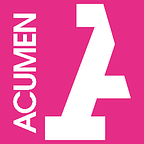As COVID-19 shuts down in-person interaction around the world, communities everywhere are increasingly relying on online services. By McKinsey’s estimation, in a matter of months, customers and businesses have leapt forward five years in the adoption of digital platforms to conduct business.
Digital platforms have proven valuable tools for making goods and services more easily accessible for middle and high-income consumers. We are increasingly seeing these online and app-based platforms emerge as a valuable tool for low-income consumers. This growth is driven primarily on mobile platforms as mobile phone access in these communities continues to increase globally, even surpassing access to electricity.
The social enterprises that leveraged these mobile platforms to serve low-income consumers have suddenly taken on new importance in helping these hard-hit communities deal with the pandemic. Acumen is supporting three such enterprises through our COVID response funds.
Sehat Kahani: Online COVID Care in Pakistan
Acumen Fellow Dr. Sara Saeed Khurram founded Sehat Kahani in 2017 to offer quality and affordable virtual health care to underserved patients in Pakistan via video conference and mobile app. The company started offering COVID-19 telemedicine services free of charge in May and has since conducted over 210,000 online consultations, impacting over 1 million people. Acumen Pakistan Director Ayesha Khan sees Sehat Kahani’s model as a prime example of the way that mobile apps and other tech-enabled platforms can enable the scale required to affect change in the region: “Given that there are over 50 million people living in poverty in Pakistan, we need to think more creatively about how to scale solutions effectively. In some sectors, this will mean going beyond solely brick-and-mortar approaches and harnessing the power of tech to exponentially increase reach.”
Boulder Care: Mobile App Technology to Treat Opioid Addiction
In the United States, Acumen healthcare investee Boulder Care has been changing opioid addiction treatment with a comprehensive mobile app offering video visits and messaging. The additional stressors brought on by COVID-19, such as social isolation or job loss can exacerbate patients’ risk of relapse. Boulder Care’s virtual treatment platform has proven even more vital — especially as public health services such as walk-in clinics or syringe exchange programs have been forced to close due to COVID. In response to the surge in demand, the company is now subsidizing or covering the cost of care for patients who cannot afford to enroll in the program. Acumen America Director Catherine Casey Nanda sees business models enabled by mobile platforms as one important way to radically increase access to critical services for low-income Americans: “Some of the most impactful models combine a high-tech approach with a high-touch service model designed not only to reach as many low-income customers as possible but with services that will meaningfully improve their lives.”
Siembra Viva: E-Commerce Maintaining Farmer Income Through COVID
E-commerce platforms are also proving critical in maintaining smallholder farmers’ incomes through the economic crisis. In Colombia, Acumen investee Siembra Viva developed a direct-to-consumer e-commerce platform in 2013 to bring remote smallholder farmers’ organic produce to urban customers. With mandatory lockdowns across the country, the demand for this e-commerce and delivery service has grown significantly during COVID, creating a new normal for both the customer and the smallholder farmer.
As access to mobile phones and online services continue to increase within low-income communities, we believe the era of COVID-19 will establish a new normal of consumer behavior and services expectations. This new normal will create many new opportunities for future social entrepreneurs and Acumen expects to see more social enterprises looking to digital solutions to meaningfully address the challenges of vulnerable communities.
Acumen’s two emergency response funds are supporting investees and Fellows’ social enterprises serving low-income communities through the COVID-19 crisis. Learn more about our COVID response.
